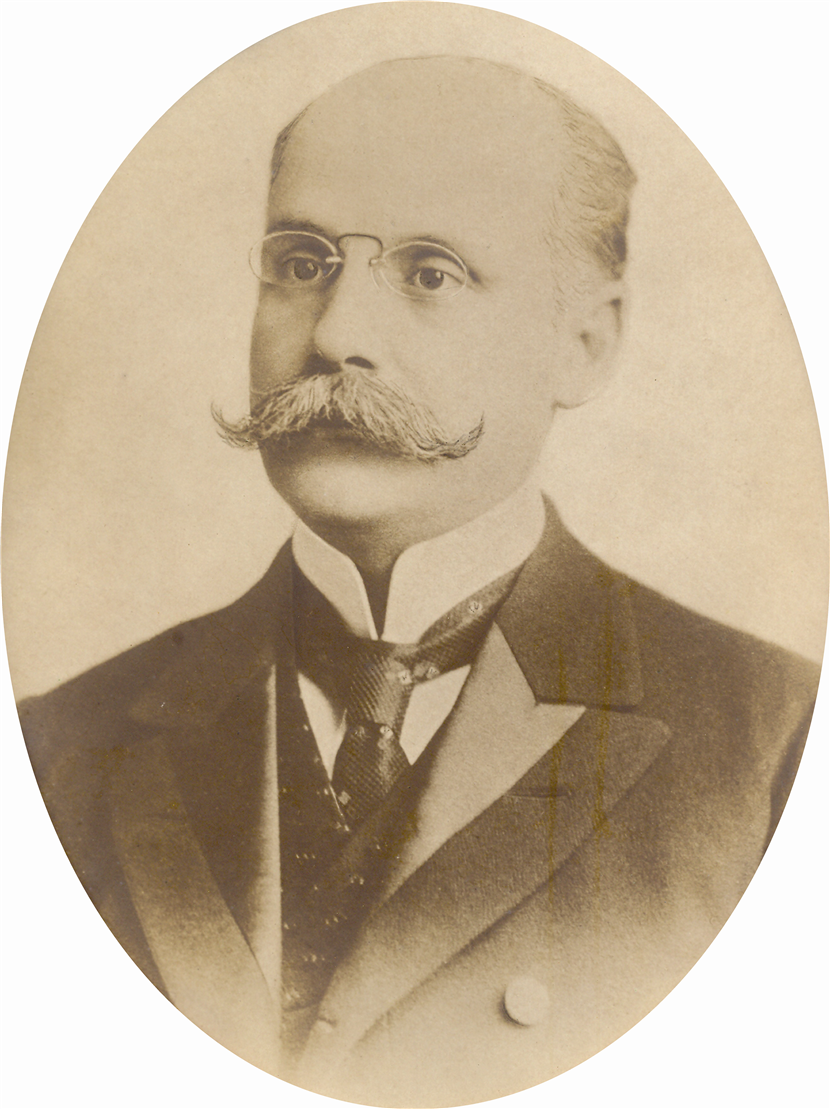The son of legal counselor Dr. Manoel do Nascimento Machado Portella and Joana Francelina Pinto Portella, Joaquim Pinto Portella was born on November 23, 1860, in the State of Pernambuco.
After submitting and defending a final thesis titled “Surgical Treatment of Uterine Fibroids: Simulated Abortion; A Comparative Study of Lithotomy and Lithotripsy in Bladder Stones; Pernicious Fevers,” he graduated in medicine in 1882 from the now defunct College of Medicine of Rio de Janeiro (currently, the Federal University of Rio de Janeiro – UFRJ).
Dr. Pinto Portella was voted to take on the position of Full Member of the Imperial Academy of Medicine on November 14, 1889, following submission of a paper called “Hip Joint Pain in Children.” Ten years later, in 1899, he wrote a remarkable, award-winning paper titled “Clinical Study on Dyspepsia,” which earned him the Academia Nacional de Medicina (National Academy of Medicine – ANM)-granted Alvarenga Prize. A couple of years later, from 1903 to 1905, he served as President of the Academy and secured the title of Emeritus Professor on July 16, 1925.
Dr. Pinto Portella worked as an Assistant Surgeon at the Beneficiência Portuguesa Hospital, and in 1890, was appointed as a Surgeon at the Santa Casa da Misericórdia General Hospital of Rio de Janeiro.
Furthermore, he served as a Surgeon at the aforementioned hospital children’s ward, and more specifically, in 1914, became the Head of Surgical Services for boys and girls at the São Zacharias Hospital.
The distinguished physician and Academician published several papers in the Annals and Bulletins of the ANM, in addition to collaborating with medical journals based in Rio de Janeiro. Among his main articles, some particularly worth noting are “Sobre o Tratamento do Noma nas Crianças, pelo Cloreto de Zinco” (“On the Treatment of Noma in Children with Zinc Chloride”); “Ortopedia na Itália e na França sob o Ponto de Vista da Moderna Ortopedia” (“Orthopedics in Italy and France from the Viewpoint of Modern Orthopedics”); “A Patogenia e Tratamento das Luxações Congênitas no Quadril” (Pathogenesis and Treatment of Congenital Hip Dislocations”); “Dos Lábios Leporinos Complicados (Goela de Lobo) e seus Resultados Ortopédicos” [“On Complicated Cleft Lips (Wolf-Hirschhorn Syndrome) and their Orthopedic Outcomes”]; “Da Operação de Kirmisson nos pés tortos” (“On Kirmisson’s Operation for Clubfoot”); and “Necessidade da Fundação de Institutos Ortopédicos e Hospitais Marítimos para Crianças Raquíticas no Rio de Janeiro” (“The Need to Establish Orthopedic Institutes and Maritime Hospitals for Stunted Children in Rio de Janeiro”).
Dr. Joaquim Pinto Portella passed away on June 22, 1934, in the city of Rio de Janeiro.
Acad. Francisco Sampaio
Número acadêmico: 156
Cadeira: 76
Cadeira homenageado: 76
Membro: Emérito
Secção: Cirurgia
Eleição: 14/11/1889
Posse: 14/11/1889
Sob a presidência: José Cardoso de Moura Brasil
Emerência: 16/07/1925
Falecimento: 22/06/1934

Número acadêmico: 156
Cadeira: 76
Cadeira homenageado: 76
Membro: Emérito
Secção: Cirurgia
Eleição: 14/11/1889
Posse: 14/11/1889
Sob a presidência: José Cardoso de Moura Brasil
Emerência: 16/07/1925
Falecimento: 22/06/1934

The son of legal counselor Dr. Manoel do Nascimento Machado Portella and Joana Francelina Pinto Portella, Joaquim Pinto Portella was born on November 23, 1860, in the State of Pernambuco.
After submitting and defending a final thesis titled “Surgical Treatment of Uterine Fibroids: Simulated Abortion; A Comparative Study of Lithotomy and Lithotripsy in Bladder Stones; Pernicious Fevers,” he graduated in medicine in 1882 from the now defunct College of Medicine of Rio de Janeiro (currently, the Federal University of Rio de Janeiro – UFRJ).
Dr. Pinto Portella was voted to take on the position of Full Member of the Imperial Academy of Medicine on November 14, 1889, following submission of a paper called “Hip Joint Pain in Children.” Ten years later, in 1899, he wrote a remarkable, award-winning paper titled “Clinical Study on Dyspepsia,” which earned him the Academia Nacional de Medicina (National Academy of Medicine – ANM)-granted Alvarenga Prize. A couple of years later, from 1903 to 1905, he served as President of the Academy and secured the title of Emeritus Professor on July 16, 1925.
Dr. Pinto Portella worked as an Assistant Surgeon at the Beneficiência Portuguesa Hospital, and in 1890, was appointed as a Surgeon at the Santa Casa da Misericórdia General Hospital of Rio de Janeiro.
Furthermore, he served as a Surgeon at the aforementioned hospital children’s ward, and more specifically, in 1914, became the Head of Surgical Services for boys and girls at the São Zacharias Hospital.
The distinguished physician and Academician published several papers in the Annals and Bulletins of the ANM, in addition to collaborating with medical journals based in Rio de Janeiro. Among his main articles, some particularly worth noting are “Sobre o Tratamento do Noma nas Crianças, pelo Cloreto de Zinco” (“On the Treatment of Noma in Children with Zinc Chloride”); “Ortopedia na Itália e na França sob o Ponto de Vista da Moderna Ortopedia” (“Orthopedics in Italy and France from the Viewpoint of Modern Orthopedics”); “A Patogenia e Tratamento das Luxações Congênitas no Quadril” (Pathogenesis and Treatment of Congenital Hip Dislocations”); “Dos Lábios Leporinos Complicados (Goela de Lobo) e seus Resultados Ortopédicos” [“On Complicated Cleft Lips (Wolf-Hirschhorn Syndrome) and their Orthopedic Outcomes”]; “Da Operação de Kirmisson nos pés tortos” (“On Kirmisson’s Operation for Clubfoot”); and “Necessidade da Fundação de Institutos Ortopédicos e Hospitais Marítimos para Crianças Raquíticas no Rio de Janeiro” (“The Need to Establish Orthopedic Institutes and Maritime Hospitals for Stunted Children in Rio de Janeiro”).
Dr. Joaquim Pinto Portella passed away on June 22, 1934, in the city of Rio de Janeiro.
Acad. Francisco Sampaio